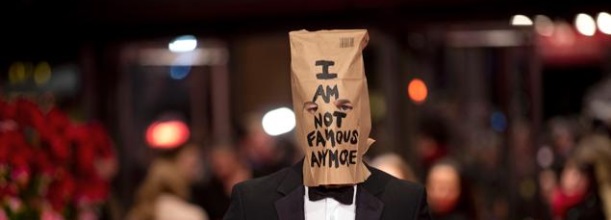I Am Not Famous Anymore – the perils of the public breakdown

As you pretty much cannot have failed to notice, Shia LaBeouf is not having a good year. The former Transformers star has been in career freefall for the last eight weeks; first his award-winning short film HowardCantour.com was outed as a work of consummate plagiarism, then LaBeouf’s repeated apologies were all found to be in themselves plagiarised from various sources, then (other) sources on the set of his new film said he was being ostracised by the rest of the cast for pulling out his tooth and refusing to wash. And now, after a quiet week or so, he’s back – ripping off inane Eric Cantona quotes in press conferences and wearing a bag on his head to a Berlinale red carpet. Isn’t it funny? The guy off Even Stevens has grown up and lost it! Lol!
To be honest, that’s more or less how we’ve been reporting the news. Shia LaBeouf isn’t a particularly distinguished actor, and in deliberately denying a small-time comics artist the money and recognition he was due he proved himself to be an unprincipled director. That’s not a narrative that we, or any other site, have had a problem regurgitating – bloated by the approbation of yes-men, an overgrown action nit decided he was above the concept of copyright and disgraced himself. Fine. What a dickhead he must be. But as LaBeouf’s public collapse continues – at the time of writing, his only tweets from the last twenty days have been the repeated phrase “I AM NOT FAMOUS ANYMORE”, tweeted (automatically, we suspect) at 8pm every day – we are forced to question what’s really going on.

Is this, as some have suggested, an elaborate performance reminiscent of Casey Affleck’s I’m Still Here, for which Joaquin Phoenix spent eighteen months pretending he was abandoning Hollywood to become a rapper? Is LaBeouf banking on the Hollywood press’ short attention span, hoping that if his antics go from weird to boring then they’ll leave him alone to work? Or is he really ill? There’s no way of knowing, at least not yet, and until we can be sure of what’s going on we need to tread very carefully.
Generally speaking, mental health issues in the public eye are not well received. There are a few celebrities whose experiences of mental illness are both well documented and generally accepted – Stephen Fry and Ruby Wax, who have drawn on their experiences of bipolar disorder for documentaries and stand-up respectively, are obvious examples – but by and large, public figures acknowledging mental illness is about as likely as Ryan Reynolds finally coming out. And who can blame them? If a celebrity does appear to be mentally ill – and between the tireless work of the paparazzi and the unfilterable dangers of Twitter, it’s next to impossible to be a discreetly mentally ill celebrity – then they can expect to be ruthlessly, ceaselessly attacked.

We only need to look as far back as the relentless demonisation of Amanda Bynes, the obviously unbalanced former child star whose life has become a whirlwind of illegal drugs and indiscreet Instagrams, to see how much happier TMZ and co. are to label a troubled individual ‘crazy‘ than think about what that word actually means. Don’t worry, this isn’t going to turn into a prissy Tumblr post about how the word ‘crazy’ is offensive – it’s just interesting, and a little arresting, to realise how happy we are to use a word that originally meant either ‘diseased’ or ‘full of cracks’, and which now means ‘mad’, about someone who is very probably suffering from a mental illness. If Rihanna was papped coming out of a private hospital looking gaunt and pale, with a hat slipping back to reveal colossal hair loss, would we talk about her as ‘cancery’? Obviously not, because this is not the sort of thing about which one can be blasé.
All this might seem to be getting away from Shia LaBeouf, but I’ve got a point. If, perish the thought, Rihanna was diagnosed with cancer, she could wear a different wig – each one made from the hair of a hundred adoring fans – every day for the rest of her life. If Lady Gaga needed a liver transplant she’d have enough left over to make a horrible, gravied 70s dinner for God (we assume he likes a big plate). But when Britney Spears, a woman whose entire life from puberty onwards had played out in the spotlight, whose marriage had collapsed, whose aunt and confidante had just died, shaved her head in an eloquent gesture of rage and frustration, how did the world respond? Forgetting for a moment that one guy, we laughed. Crazy, crazy Britney, acting so crazy ‘cos she’s crazy. If she’d seen it coming, she might not have released a single called Crazy, but that’s hindsight for you. Because the physical manifestations of mental illness so often come about by the hand of the person who’s suffering, rather than pushing through their skin or claiming their organs, we are bafflingly willing to trade sympathy for blame.

One week ago, the Sydney Telegraph covered the news of Philip Seymour Hoffman’s death from a presumed drug overdose with the words ‘Kids Grieve for Junkie Actor Dad‘. This, lest we forget, was the story of a man who was killed by a drug addiction he’d repeatedly tried to overcome, with the help of doctors, as is appropriate when you have an ILLNESS. If Philip Seymour Hoffman had fallen down a manhole, would the Sydney Telegraph have run with ‘Kids Grieve for Incautious Actor Dad’? ‘Clumsy Actor Dad’? If he’d had cancer, would they have published ‘Kids Grieve for Tumourous Actor Dad’?
The crux of the matter is this; we’re willing, even keen, to create an artificial division between illnesses that we see as worthy of sympathy and illnesses that we consider deserving of blame. Thirteen years ago, the ‘Paedogeddon’ special of Chris Morris’ brilliant Brass Eye satirised the notions of ‘Good AIDS’, which results from an infected blood transfusion, and ‘Bad AIDS’, which is the just and inevitable punishment for taking intravenous drugs or having unsafe sex. We could just as easily talk about ‘good illness’ – Mia Farrow’s polio, Michael J Fox’s Parkinson’s Disease, Angelina Jolie’s cancer – and ‘bad illness’ – Lindsay Lohan’s drug addiction, Oliver Reed’s alcoholism, Joseph Gordon-Levitt’s depression. Reed, whose later years were sadly punctuated by booze-sodden appearances on chat shows (at least one of which chose to exacerbate his illness by filling his dressing room with alcohol and then covertly filming the inevitable outcome), is now almost as well remembered for his drinking as for his phenomenal body of work; if we can reduce him to a figure of fun, the public seems to have collectively reasoned, then we don’t need to worry about a man in pain.
And so, we’re finally back to Shia LaBeouf, who with his absurd outbursts and improper behaviour is neatly filling (alright, not quite filling) Oliver Reed’s vacant chair. It’s entirely possible that Shia is not ill, and that this is all part of a grand plan – in fact, as his actions grow more inexplicable I’ve noticed that more and more news outlets seem keen to assume that this is just another I’m Still Here moment. I wouldn’t like to speculate on whether this is because the press is determined not to be fooled again, or whether it’s simply the easier, less complicated thing to believe – after all, I had a much simpler time of it writing articles like this than the one you’re reading. It’s simply less hassle, for journalists working to deadlines, to assume that it’s all a big joke, and that either LaBeouf is in on it or he’s ‘crazy’. Only Shia, and possibly his doctors, know whether or not he’s well; it’s arguably none of our business, although for people who embrace (even briefly) the cult of celebrity it’s always hard to draw a reliable line between private matter and that relentless hack, Public Interest.
A couple of years ago, I had a breakdown triggered by a combination of major depressive disorder and the misuse of alcohol and prescription drugs. I sent several angry, disturbed tweets during this episode; tweets that I later deleted, without them having come to the attention of anyone in particular. Had I been in the public eye rather than being an obscure journalist, I have no doubt that my ‘crazy outburst’, ‘Valium joyride’ or ‘booze hell’ would have briefly been the toast of the gossip sites; as it was, I was thankfully left to recover in peace. I’m not for a moment suggesting that Shia is depressed, or substance-dependent, or subject to any of the other largely unhelpful labels I’ve been given at various points. The only thing I can say with any degree of confidence is that the last eight weeks have probably not done his career any good; but then again, neither did Indiana Jones and the Kingdom of the Crystal Skull. But if he is ill, and our response as a society – and this includes Best For Film, and me – is to laugh at someone who has been constantly in the limelight since the age of fourteen, whose apparently sincere if arguably misjudged opinions on censorship and copyright have been made fun of the world over, who seems simply to want to be left alone; if this is our reaction to someone who is sick and suffering, then I’m glad, and grateful, that when I was ‘crazy’ nobody knew or cared.





Great, thoughtful article. It will be interesting to see how LaBeouf’s journey continues – I’ve never been a fan of his work, but I would certainly never wish a breakdown on anyone, despite Kingdom of the Crystal Skulls. If it is all a stunt, he should be embarrassed and ashamed of himself, but if he really is mentally unwell, then we can only hope he seeks the treatment he obviously needs.